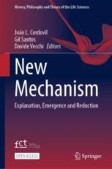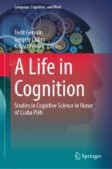Search
Search Results
-
How to Choose a Gauge? The Case of Hamiltonian Electromagnetism
We develop some ideas about gauge symmetry in the context of Maxwell’s theory of electromagnetism in the Hamiltonian formalism. One great benefit of...

-
Book (Decomposition)
A gap appears between space and depiction, beginning a thread on the limits of representation as an idea central to the performance of theatrical,...
-
Relevance-Sensitive Truth-Trees
Our goal is to articulate a clear rationale for relevance-sensitive propositional logic. The method: truth-trees. Familiar decomposition rules for...
-
Methodological Individualism as Holism of the Parts: From Epistemology to Ontology
It is argued that methodological individualism entails a holism of the parts, as originally proposed by Jan Smuts (1926/1927), where (1) the...
-
Analogy and Composition in Early Nineteenth-Century Chemistry The Case of Aluminium
Around fifteen years before the chemical substance alumina (aluminium oxide) could be decomposed in the laboratory, it was identified as a compound...
-
Revisiting McGee’s Probabilistic Analysis of Conditionals
This paper calls for a re-appraisal of McGee’s analysis of the semantics, logic and probabilities of indicative conditionals presented in his 1989...
-
Epistemology of Death (2): Experiments, Tests and Mechanisms
In this chapter, I investigate the epistemology of the evolutionary biology of death and aging, by reviewing the variety of experimental tests that...
-
The New Mechanistic Theory of Explanation: A Primer
In this chapter, I introduce the new mechanistic framework of explanation, focusing in particular on constitutive mechanistic explanation. I evaluate...
-
Getting machines to do your dirty work
Autonomous systems are machines that can alter their behavior without direct human oversight or control. How ought we to program them to behave? A...
-
Prolegomenon
Nowadays, in an evolutionary environment dominated by Sociality Brain mind-inspired, it is possible and necessary to De-Anthropocentric due to the...
-
Know-how and why self-regulation will not go away
In the 1940s, Gilbert Ryle argued that knowing how to do something is not just a matter of being well-regulated but also a matter of self-regulation....
-
Atomic number and isotopy before nuclear structure: multiple standards and evolving collaboration of chemistry and physics
We provide a detailed history of the concepts of atomic number and isotopy before the discovery of protons and neutrons that draws attention to the...

-
Mechanistic Explanations in Physics: History, Scope, and Limits
Despite the scientific revolutions of the twentieth century, mechanistic explanations show a striking methodological continuity from early modern...
-
The Early Acquisition of Morphology in Agglutinating Languages: The Case of Hungarian
The present work reviews the first steps towards a better understanding of the acquisition of morphology in an agglutinating language, Hungarian. The...
-
Ideological Contention
The following chapter explores the relationship between framing and the theory of ideological contention (through a review and critique of the...
-
Impact of Corporate Culture on Environmental Performance
We examine the impact of corporate culture on environmental performance using a sample of 7199 firm-year observations over the period of 2002–2018....
-
No Time for Ethics: How and When Time Pressure Leads to Abusive Supervisory Behavior
We explore in this study whether, how, and when time pressure leads to abusive supervisory behavior. Based on the attentional focus model, we propose...

-
Human Condition
This article examines the human condition in the Anthropocene, based on the definition given by Hannah Arendt in The Human Condition (1958). That...
-
Irrational methods suggest indecomposability and emergence
This paper offers a practical argument for metaphysical emergence. The main message is that the growing reliance on so-called irrational scientific...

-
The division of cognitive labor and the structure of interdisciplinary problems
Interdisciplinarity is strongly promoted in science policy across the world. It is seen as a necessary condition for providing practical solutions to...

